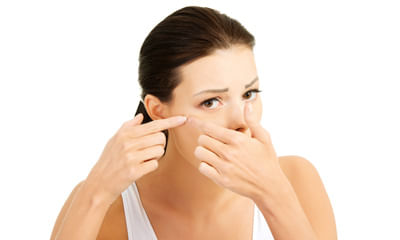Get the App
For Doctors
Login/Sign-up
Last Updated: Aug 29, 2019
BookMark
Report
ACNE-REVISITED
Dr. Chandrasekaran . ChidambaramAlternative Medicine Specialist • 32 Years Exp.CERTIFICATION IN BACH FLOWER REMEDIES OF ENGLAND, Ph.D DOCTOR OF PHILOSOPHY IN BIOCHEMISTRY, B.S.M.S BACHELOR OF SIDDHA MEDICINE AND SURGERY,
The following may cause or worsen acne:
Family history of acne
Greasy/oily cosmetic or hair products containing vegetable or animal fats
Hormonal changes associated with adolescence, pregnancy, or menstruation (acne tends to flare up 2 to 7 days before menstruation begins)
Certain medications such as corticosteroids, androgens, oral contraceptives, lithium, halogens, isoniazid, phenytoin, phenobarbital, and high levels of iodine (such as from kelp)
Environmental irritants such as industrial cutting oils, tar, wood preservatives, sealing compounds, and other pollutants
Sweating and friction, such as from headbands, back packs, bicycle helmets, or tight collars
High levels of humidity
Squeezing and picking comedones
Although still controversial, some researchers believe that stress and sun exposure can also cause or aggravate existing acne. This may be due to the use of oily sunscreens however, as some people with acne actually experience improvement in symptoms with exposure to the sun.
The main goals of acne treatment are to prevent scarring, reduce the number of painful lesions, and minimize the stress and embarrassment related to the condition. The basic principle of skin care is to wash the affected area no more than one to two times per day with a mild, nondrying soap. Frequent washing and the use of harsh soaps can actually make the condition worse. Healthcare practitioners will often recommend topical medications as their first choice for treating acne (generally either benzoyl peroxide or a class of drugs known as retinoids). These are designed to wear away the top layer of skin (exfoliate) as well as to reduce abnormal clumping of cells in the follicles, oil and bacteria production, and inflammation. Additionally, facial steaming with accompanying manual extraction of the comedones (such as by a professional aesthetician) is valuable for exfoliation as well. Although more research is needed to investigate the safety and effectiveness of alternative remedies for acne, people with mild cases of acne may experience an improvement in symptoms from herbs , Ayurveda, or homeopathy . Mind/body techniques such as biofeedback or hypnosis may also help to alleviate feelings of anxiety and depression that some individuals experience with this skin condition. Expect to use medications and/or complementary and alternative remedies for at least 6 to 8 weeks before seeing a noticeable improvement in symptoms. Seek medical care if infantile acne does not improve within three months.
Lifestyle Modifications:
Avoid the sun. Overexposure to the sun can worsen acne.
Use cosmetics sparingly. Use only hypoallergenic, oil-free cosmetics.
Wash face gently with unscented, oil-free cleansers and keep skin clean. Remember: Acne is not caused by dirt. Scrubbing inflamed skin makes acne worse.
Control the urge to squeeze, scratch, or pick at pimples. Let them drain when they are ready.
Try products that contain benzoyl peroxide for mild to moderate acne.
Young men with moderate to severe acne should use a new razor blade every time they shave to lessen risk of infection.
Avoid alcohol-based aftershaves. Instead, use herbal alternatives that include essential oils of lavender, chamomile, or tea tree oil.
Eliminate foods high in fat, hormones, and iodine.
Eat a range of whole, natural foods, especially raw foods. Avoid processed foods with additives and trans-fatty acids.
Drink adequate liquids, especially pure water and green tea.
Homeopathy
There have been few studies examining the effectiveness of specific homeopathic remedies. Professional homeopaths, however, may recommend one or more of the following treatments for acne based on their knowledge and clinical experience. Before prescribing a remedy, homeopaths take into account a person's constitutional type. In homeopathic terms, a person's constitution is his or her physical, emotional, and intellectual makeup. An experienced homeopath assesses all of these factors when determining the most appropriate remedy for a particular individual.
Belladonna— for people who experience flushes of heat to the face or who have inflamed pustular acne that improves with cold applications
Calendula— for skin conditions involving pustules or blisters
Hepar sulphur— for painful, pus-filled acne
Kali bromatum— for deep acne, especially on the forehead, in persons who are chilled and nervous
Silicea— for pustules or pit-forming acne
Family history of acne
Greasy/oily cosmetic or hair products containing vegetable or animal fats
Hormonal changes associated with adolescence, pregnancy, or menstruation (acne tends to flare up 2 to 7 days before menstruation begins)
Certain medications such as corticosteroids, androgens, oral contraceptives, lithium, halogens, isoniazid, phenytoin, phenobarbital, and high levels of iodine (such as from kelp)
Environmental irritants such as industrial cutting oils, tar, wood preservatives, sealing compounds, and other pollutants
Sweating and friction, such as from headbands, back packs, bicycle helmets, or tight collars
High levels of humidity
Squeezing and picking comedones
Although still controversial, some researchers believe that stress and sun exposure can also cause or aggravate existing acne. This may be due to the use of oily sunscreens however, as some people with acne actually experience improvement in symptoms with exposure to the sun.
The main goals of acne treatment are to prevent scarring, reduce the number of painful lesions, and minimize the stress and embarrassment related to the condition. The basic principle of skin care is to wash the affected area no more than one to two times per day with a mild, nondrying soap. Frequent washing and the use of harsh soaps can actually make the condition worse. Healthcare practitioners will often recommend topical medications as their first choice for treating acne (generally either benzoyl peroxide or a class of drugs known as retinoids). These are designed to wear away the top layer of skin (exfoliate) as well as to reduce abnormal clumping of cells in the follicles, oil and bacteria production, and inflammation. Additionally, facial steaming with accompanying manual extraction of the comedones (such as by a professional aesthetician) is valuable for exfoliation as well. Although more research is needed to investigate the safety and effectiveness of alternative remedies for acne, people with mild cases of acne may experience an improvement in symptoms from herbs , Ayurveda, or homeopathy . Mind/body techniques such as biofeedback or hypnosis may also help to alleviate feelings of anxiety and depression that some individuals experience with this skin condition. Expect to use medications and/or complementary and alternative remedies for at least 6 to 8 weeks before seeing a noticeable improvement in symptoms. Seek medical care if infantile acne does not improve within three months.
Lifestyle Modifications:
Avoid the sun. Overexposure to the sun can worsen acne.
Use cosmetics sparingly. Use only hypoallergenic, oil-free cosmetics.
Wash face gently with unscented, oil-free cleansers and keep skin clean. Remember: Acne is not caused by dirt. Scrubbing inflamed skin makes acne worse.
Control the urge to squeeze, scratch, or pick at pimples. Let them drain when they are ready.
Try products that contain benzoyl peroxide for mild to moderate acne.
Young men with moderate to severe acne should use a new razor blade every time they shave to lessen risk of infection.
Avoid alcohol-based aftershaves. Instead, use herbal alternatives that include essential oils of lavender, chamomile, or tea tree oil.
Eliminate foods high in fat, hormones, and iodine.
Eat a range of whole, natural foods, especially raw foods. Avoid processed foods with additives and trans-fatty acids.
Drink adequate liquids, especially pure water and green tea.
Homeopathy
There have been few studies examining the effectiveness of specific homeopathic remedies. Professional homeopaths, however, may recommend one or more of the following treatments for acne based on their knowledge and clinical experience. Before prescribing a remedy, homeopaths take into account a person's constitutional type. In homeopathic terms, a person's constitution is his or her physical, emotional, and intellectual makeup. An experienced homeopath assesses all of these factors when determining the most appropriate remedy for a particular individual.
Belladonna— for people who experience flushes of heat to the face or who have inflamed pustular acne that improves with cold applications
Calendula— for skin conditions involving pustules or blisters
Hepar sulphur— for painful, pus-filled acne
Kali bromatum— for deep acne, especially on the forehead, in persons who are chilled and nervous
Silicea— for pustules or pit-forming acne



+1.svg)
